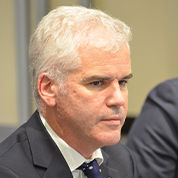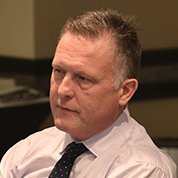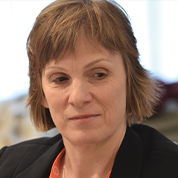Roundtable: the right outcomes
There is increasing support for value-based healthcare. There has been a lot of work in the NHS on improving data on costing – one half of the value equation. But the other key factor in assessing the value of any decision or intervention is the outcome. And there has been far less done to put outcomes alongside cost data or to make sure the outcomes monitored are the ones that are most important for patients.
 ‘You can’t address the value equation until you’ve decided what outcomes you are trying to deliver,’ Sally Lewis (left) told a roundtable organised by the HFMA’s Healthcare Costing for Value Institute in December.
‘You can’t address the value equation until you’ve decided what outcomes you are trying to deliver,’ Sally Lewis (left) told a roundtable organised by the HFMA’s Healthcare Costing for Value Institute in December.
The roundtable, supported by Johnson & Johnson Medical Devices Companies, was convened to discuss where different organisations are in terms of their collection and use of outcome measures. It also aimed to identify challenges to the wider use of outcome measures and to understand the specific role finance practitioners should play in moving this agenda forward.
Dr Lewis, GP and national clinical director for value-based healthcare for NHS Wales, and chair for the roundtable, said that outcome measures came in different guises. ‘We are talking about clinical outcomes that you might find in national clinical audits and registries,’ she said. ‘But we also need to think about patient-reported outcome measures (PROMs) and experience measures (PREMs) – for example, have we reduced patients’ pain, can they now perform their daily activities or are they sleeping better?’
There is growing recognition that, while the NHS collects a mass of clinical data, many of the measures focus on processes or outputs, not outcomes.
And, where there are outcome measures, they don’t necessarily reflect the outcomes that patients most want to achieve.
Collection question
The roundtable kicked off by discussing why health services should be collecting patient-defined outcomes at all. For some, it was about the NHS catching up with other areas of people’s lives and meeting public expectation.
 ‘Other industries and services are modernising their policy and practice in ways that cut with the grain of wider changes in society and public expectations,’ said James McGowan (right), specialty registrar in public health medicine at Public Health England. ‘As people become more empowered to make their own decisions in respect of using services, including health services, the NHS has a principled and practical need to respond to this.’
‘Other industries and services are modernising their policy and practice in ways that cut with the grain of wider changes in society and public expectations,’ said James McGowan (right), specialty registrar in public health medicine at Public Health England. ‘As people become more empowered to make their own decisions in respect of using services, including health services, the NHS has a principled and practical need to respond to this.’
Simon Kenny (pictured), paediatric surgeon and clinical lead for the national Getting it Right First Time programme, and former clinical director at  Alder Hey Children’s Hospital NHS Foundation Trust, said that outcome data could inform both the immediate care being provided, while also supporting broader decisions about interventions that deliver the best outcomes for patients.
Alder Hey Children’s Hospital NHS Foundation Trust, said that outcome data could inform both the immediate care being provided, while also supporting broader decisions about interventions that deliver the best outcomes for patients.
‘Big data can help us do that, but it will only happen if we’ve got the outcomes embedded,’ he said. Talking specifically about PROMs,
he added that it was a key way to ‘measure outcomes that are important to patients’.
 Glyn Jones (pictured right), finance director at Aneurin Bevan University Health Board, agreed, suggesting that outcomes also provided a common language to improve engagement between clinicians and finance staff on deciding how resources should be used. PROMs also helped clinicians have more meaningful discussions with patients about the right next steps in their care. A ‘successful’ surgical intervention, for example, might not address psychological or social issues affecting a patient and a PROM can help to inform patient-clinician discussions.
Glyn Jones (pictured right), finance director at Aneurin Bevan University Health Board, agreed, suggesting that outcomes also provided a common language to improve engagement between clinicians and finance staff on deciding how resources should be used. PROMs also helped clinicians have more meaningful discussions with patients about the right next steps in their care. A ‘successful’ surgical intervention, for example, might not address psychological or social issues affecting a patient and a PROM can help to inform patient-clinician discussions.
 Duncan Orme (pictured left), operational director of finance at Nottingham University Hospitals NHS Trust, stressed the importance of understanding patients’ own views of healthcare interactions. ‘Work by the Royal College of Physicians found that 20% of pensioners who attend an outpatient appointment reported feeling worse afterwards because of the stress involved in getting there,’ he said. ‘When you add this into the climate impact – with nearly 5% of road traffic in England being NHS-related – then arguments start to build up for doing something differently with how we work with patients, starting with allowing patients to report their own outcomes.’
Duncan Orme (pictured left), operational director of finance at Nottingham University Hospitals NHS Trust, stressed the importance of understanding patients’ own views of healthcare interactions. ‘Work by the Royal College of Physicians found that 20% of pensioners who attend an outpatient appointment reported feeling worse afterwards because of the stress involved in getting there,’ he said. ‘When you add this into the climate impact – with nearly 5% of road traffic in England being NHS-related – then arguments start to build up for doing something differently with how we work with patients, starting with allowing patients to report their own outcomes.’
PROMs data is essential to realise these social and economic benefits.
 Bill Gregory (pictured left), chief finance officer and deputy chief executive of Lancashire Care NHS Foundation Trust, and immediate past president of the HFMA, underlined this key role for PROMs. ‘It is only when you are in an outpatients department as a patient that you see it with their eyes,’ he said. ‘Only the patient travels through the whole pathway and they see the disjoins – and if you don’t ask the patient, you won’t find out about them.’
Bill Gregory (pictured left), chief finance officer and deputy chief executive of Lancashire Care NHS Foundation Trust, and immediate past president of the HFMA, underlined this key role for PROMs. ‘It is only when you are in an outpatients department as a patient that you see it with their eyes,’ he said. ‘Only the patient travels through the whole pathway and they see the disjoins – and if you don’t ask the patient, you won’t find out about them.’
The reason to collect outcome data also changes depending on what you want to do with the data. Chris Graham (right), chief executive officer of Picker, which specialises in undertaking surveys of patient experience, suggested there are ‘many different whys’.
suggested there are ‘many different whys’.
‘These are often in opposition to each other and there may not be a single approach that meets every need,’ he said. ‘If you want to have person-centred care, you need to recognise that what matters to individual patients differs – so one-size-fits-all won’t work.
‘You might need something different for clinical practice, something for local service improvement work and then something different again for national collections.’
 Acknowledging these different uses for outcome data, Clara Day (left), nephrology consultant and associate medical director for finance at University Hospitals Birmingham NHS Foundation Trust, stressed that it was important to be clear about the reasons for collecting PROMs data in advance.
Acknowledging these different uses for outcome data, Clara Day (left), nephrology consultant and associate medical director for finance at University Hospitals Birmingham NHS Foundation Trust, stressed that it was important to be clear about the reasons for collecting PROMs data in advance.
‘If you want the patient to fill something in, they need to know why they are doing it,’ she said. ‘Is it to help inform their care now or to support population health? Both are fine, but you need to be clear and get the balance right. [As a clinician] it can also be frustrating if a patient reports on something and you receive a report six months later showing how a patient had a bad time, but you didn’t know about it at a point when you could have done something about it.’
Dr Lewis underlined the importance of embedding the measurement in direct patient care. ‘A PROM is essentially a structured communication from the patient,’ she said. ‘They are telling us what they need, not just the result of a treatment.’
What to collect
 The roundtable next turned its attention to the question of what to collect. It started by discussing the data already collected in the NHS. Jenny Lewis (pictured left) is the analytics and content lead for the National Clinical Improvement Programme, which is developing a secure online portal to enable (initially) surgeons to view outcome data and to support consultant appraisal. The NCIP, which runs as part of the GIRFT programme, has to date been implemented across eight surgical specialties and is being initially rolled out to five trusts to pilot its use.
The roundtable next turned its attention to the question of what to collect. It started by discussing the data already collected in the NHS. Jenny Lewis (pictured left) is the analytics and content lead for the National Clinical Improvement Programme, which is developing a secure online portal to enable (initially) surgeons to view outcome data and to support consultant appraisal. The NCIP, which runs as part of the GIRFT programme, has to date been implemented across eight surgical specialties and is being initially rolled out to five trusts to pilot its use.
This programme has been set up to use data that already exists, either in the national hospital episode statistics data set or from audit or registry data. Dr (Jenny) Lewis said that existing data should be the starting point for outcomes.
‘There is a vast amount of data collected and pitifully small amounts of it that actually gets out into the hands of clinicians,’ she said. While there were issues that needed to be addressed in terms of using or sharing some of the data, there was certainly no shortage of it. ‘It is amazing what you can get out of it if you throw the right analytical resource at it,’ she said, adding that analytical expertise was an area of major underinvestment across the NHS.
Picking up the issue of data quantity, Dr McGowan called for data collection to be rationalised. He emphasised the importance of clinical leadership in this process, but said there also needed to be greater focus on building the evidence base to support high-quality measurement in the NHS.
‘Many measures and indicators are used in healthcare,’ he said. ‘But too small a proportion of them are patient-based or patient-focused and an even smaller proportion are supported by evidence. Addressing this imbalance should be a priority for clinical leaders, researchers and policymakers.’
So, make better use of existing data an agreed starting point. But there was also recognition that this may need to be supplemented with PROMs to get a more rounded view.
NHS Wales’ Dr (Sally) Lewis asked the participants how agreement could be gained among clinicians about what to collect. ‘For example, if respiratory physicians have a view on what PROMs should be used in asthma, how do we get them to a real consensus?’
Mr Gregory said there was a precedent with the work on costing and tariff development. There was wide-ranging input from clinicians into the development of the HRG4 currency, which was the first healthcare resource group currency designed to be used for payment purposes.
Dr (Jenny) Lewis agreed that clinical ownership was important and that the NCIP had used a similar approach of involving the royal colleges and professional bodies to get endorsement for the metrics it uses. ‘Once you’ve got that endorsement, there is a degree of ownership, which is helpful,’ she said.
However, she warned that it didn’t necessarily last, as clinicians out in the field often had different ideas. And getting a patient perspective was a continuing challenge. ‘There has been little patient involvement in our contact with the professional bodies,’ she said.
 Su Rollason (pictured right), chief finance officer of University Hospitals Coventry and Warwickshire NHS Trust, suggested that outcome standards from the International Consortium for Health Outcomes Management (ICHOM) provided a good place to start.
Su Rollason (pictured right), chief finance officer of University Hospitals Coventry and Warwickshire NHS Trust, suggested that outcome standards from the International Consortium for Health Outcomes Management (ICHOM) provided a good place to start.
These outcome sets – including clinical outcomes and PROMS – have built-in clinical input, having been pulled together by teams of clinicians, and are being adopted by increasing numbers of health bodies across the globe, opening up the potential for benchmarking.
The trust has done pioneering work on collecting prostate cancer outcomes – looking particularly at the outcomes delivered using robotic surgery.
‘We went to ICHOM because we needed clinically recognised outcomes that gave us the patient perspective,’ said Ms Rollason. However, having decided what outcomes they wanted to collect, the next job was to work out what data they already had.
‘We were amazed at the amount of data we capture and submit,’ she said. ‘However, it is completely siloed, isolated and in most cases not used for any other purposes.’
Offering another ‘off-the-shelf’ solution, Professor Kenny also highlighted the work undertaken as part of the COMET initiative, started in Liverpool, to develop core outcome sets to support clinical studies, audits and research.
 But Lee Outhwaite (pictured left), director of finance and contracting at Chesterfield Royal Hospital NHS Foundation Trust, raised concerns about the scope of PROMs. ‘What does a PROM actually tell us?’ he asked. ‘If it is for a patient in end-stage renal failure receiving a new kidney, they are likely to be quite pleased with the outcome. But if someone has multiple comorbidities and is socially isolated, what you find out from an episodic treatment might have little to do with the intervention.’
But Lee Outhwaite (pictured left), director of finance and contracting at Chesterfield Royal Hospital NHS Foundation Trust, raised concerns about the scope of PROMs. ‘What does a PROM actually tell us?’ he asked. ‘If it is for a patient in end-stage renal failure receiving a new kidney, they are likely to be quite pleased with the outcome. But if someone has multiple comorbidities and is socially isolated, what you find out from an episodic treatment might have little to do with the intervention.’
Mr Outhwaite said the service needs to start measuring broader health and wellbeing metrics for the local population. ‘That will help us see the impact of upstream interventions around social exclusion and isolation,’ he said.
There was a lot of discussion around the benefits of standardising outcome measures rather than allowing different organisations to do their own thing. Using bespoke outcome measures in a single organisation may help with direct care locally, but if multiple organisations collect the same outcome measure, it opens up the potential to compare and identify best practice and opportunities to improve.
Professor Kenny went further: not only did organisations need to collect the same outcome measures – ask the same question – but the data needed to be widely accessible. ‘The days of the standalone outcomes database are dying,’ he said. ‘Data needs to sit centrally and be available to the public, commissioners, providers and clinicians,’ he said. Such a system should be built on solid foundations, so the NHS number and the GMC number would be key to any future development. Professor Kenny suggested the NCIP offered this.
Mr Graham said the NHS was still a long way off a comprehensive, single system to collect and analyse outcomes. ‘To build a future-proof system of measurement, you’d need a mechanism to aggregate lots of different types of data and structure it around patients so that patients become the organising point in the data set and the data follows them,’ he said. ‘That’s really important because most current mechanisms are focused on single services, illnesses or conditions and don’t take account of individual patient complexity and wider determinants of health. You need as much data in one place as possible.’
Tech sector
There were lots of obstacles to developing such an approach, including public confidence, information governance and consent. But to move forward, the NHS needed to harness the expertise from other sectors and especially technology companies. ‘The likes of Google may not be doing this in a way we would want in the NHS but they have lots of experience to learn from,’ said Mr Graham.
 Neil Davis (pictured right), director of commercial and strategic capabilities at Johnson & Johnson Medical Devices Companies, said there was a rich volume of data, but to gain value from it, digital systems were needed to support its use.
Neil Davis (pictured right), director of commercial and strategic capabilities at Johnson & Johnson Medical Devices Companies, said there was a rich volume of data, but to gain value from it, digital systems were needed to support its use.
‘We need systems that allow for better data analysis, segmentation and best practice sharing to drive better outcomes for patients and bring more value across the NHS. This provides a real opportunity and an important role for industry to use our resources to innovate and create the artificial intelligence (AI) capability for the health sector,’ he said.
Johnson & Johnson, for example, already works in partnership with Google on AI and use of data. ‘The nature of our organisation means we’re embedded in hospitals and theatres, not just across the country, but globally. So we’re in a very strong position to use the insights we gain from this to successfully partner with the NHS to bring a meaningful solution to this opportunity,’ he added. ‘Of course, with any new approach, regulation and protecting patient data is fundamental and something we would support developing in collaboration with regulators and authorities.’
Mr Jones felt a more organic approach to measuring and collecting outcomes was more realistic. ‘How do you design a big theoretical model that involves everyone and gets their buy-in and then collects a consistent set of outcomes?’ he asked. ‘My perspective is that you should start at the ground level – at the front line – and build on this involving different people and different groups.’
This has been the approach at Aneurin Bevan University Health Board, which began its value-based journey five years ago. ‘We started at a simple level by just trying it in one or two areas, such as Parkinson’s disease,’ he said. ‘We were manually collecting outcomes and working with clinicians to see how we could better design services.’ The health board knew that, to collect and use outcomes at scale, it needed an IT system, and the ‘start small’ approach encouraged clinical buy-in and demonstrated positive results.
One of the next areas it is considering is working with social care – aiming to collect a wider set of care outcomes.
Mr Jones said adopting a big bang approach – or waiting for a service-wide system – would have likely meant the organisation making little or no progress. ‘The answer is probably somewhere in between: some bottom up work along with a top down approach that enables collection and use of outcomes at a system level, enabling it to be used with individual patients, along a range of care pathways and to inform decisions at a population level.’
Perhaps the real challenge is implementing PROMs and outcome measurement at scale. Mr Orme described Nottinghamshire’s view of ‘at scale’ which had focused within the county boundaries.
‘Our key challenge was the need to engage with primary care,’ he said. ‘The project required their data to understand complex comorbidities, when examining outcomes for patients with type two diabetes.’
Developing trust and offering win-win arrangements with primary care were essential in gaining access to the insights from other providers’ data sets.
Mr Gregory said the service should explore existing events where people interact with health services – such as repeat prescriptions. ‘Is that an opportunity to ask simple questions?’ he asked, recognising that these questions couldn’t be too detailed or intrusive. And he said that supporting people to become more activated in terms of their wellbeing and condition would also provide a better foundation for greater collection of PROMs data.
Digital solutions are likely to play a major role. Professor Kenny referenced a patient portal being developed at Alder Hey as part of its global digital exemplar programme. While this would provide opportunities to deliver routine communications to patients, it also opens up the potential for collecting clinical outcomes. Dr (Sally) Lewis said the portal’s two-way communication would also put the patient in charge of governance, untying some of the knots the health service has found itself embroiled in over information governance and consent. The NHS app was also mentioned as a possible way of collecting outcome data.
Two principles of design should be adopted for any system of outcomes collection, according to Mr Graham. ‘First, you have to minimise the burden of administration,’ he said. ‘Otherwise it will be unbearable on the system – and that suggests a digital approach. Second, measure as rarely as possible and use as often as you can. At the moment, the system tends to measure frequently and then not use the information as much as we should. We need a total reversal of this situation.’
Mr Jones said clinician and patient buy-in were also essential to ramping up outcome collection. ‘You need to work with patients to convince them that this is not just an Amazon after-sales survey but an important part of their care – allowing them to take control of how their care is delivered,’ he said. And he said that once buy-in was in place, organisations needed to make it convenient for patients to complete the essential information – via a smart app while waiting to go into a clinic, for example.
Dr Day again underlined the importance of clinical buy-in in any scale-up. ‘We have a national renal PREM and we’ve started collecting some PROM data as well,’ she said. ‘It can be looked at as a curiosity, as something that is interesting. But it should be used to improve and guide care at an individual and unit level, not simply to compare between patients or units.’ Patient outcome data must be used to drive transformation.
At Aneurin Bevan, the health board’s investment in an outcomes reporting system is helping it to scale up – although Mr Jones warned that this alone would not solve all issues. There was still a need to ensure that different systems could talk to each other. By solving this, it is possible to develop single dashboards for clinicians, enabling them to easily access all the relevant data to discuss the patient’s care and inform decision-making.
The roundtable also discussed how data from outcome measures could be turned into useful information to inform decision-making. Dr (Jenny) Lewis said there was a role for digital design agencies to feed back information in a way that directly supports the decision to be taken. ‘In the NHS, we have a tendency to build a dashboard for one purpose and then use it for 10 other things,’ she said. This doesn’t work and can discredit the data and put people off using it.
Mr Graham agreed that visualisation was important, with boards wanting information in a totally different format to the frontline. While boards want detailed reports and benchmark data, clinicians often prefer narrative feedback and infographics that engage them more.
This brought the roundtable to its final question of the day. What is the role of finance teams in mainstreaming the collection and use of patient-defined outcome data in the NHS? Ms Rollason said finance professionals’ training meant they were well suited to support the roll-out of outcomes.
‘Finance people have experience with very large data sets,’ she said. ‘They are objective in looking at data and they have a privileged view over the whole pathway in an organisation and already engage with many of the key stakeholders.’
Mr Orme said the finance function also had a role in ensuring future payment systems supported the collection of robust data. The payment by results (PBR) system had led to a major increase in coding and data quality, even though there are now plans to move towards population-based payment approaches.
‘While the finance profession has recognised what was wrong with PBR, it has provided an enormously valuable data set and we mustn’t throw the baby out with the bathwater,’ he said.
‘There is real value to developing the contract data into an outcome-focused data set, and finance professionals are in a unique position to help develop our understanding of outcomes and value.’
Finance leaders will also have a major influence on the development of the outcomes agenda as they have a leading role in investment decisions. Will they support investment in outcomes? Mr Gregory said some would be in the vanguard and the HFMA Healthcare Costing for Value Institute had a role in encouraging others to follow them rather than wait to see benefits emerging. However, he added that the focus needed to shift towards system value and system outcomes, rather than the narrower focus on individual organisational value.
Overall the roundtable agreed that more needed to be done to demonstrate the value of collecting and using outcomes to improve pathways. They called for more case studies to be shared and suggested more peer-reviewed evidence would help demonstrate this as good value for citizens, patients and clinicians.Related content
We are excited to bring you a fun packed Eastern Branch Conference in 2025 over three days.
This event is for those that will benefit from an overview of costing in the NHS or those new to costing and will cover why we cost and the processes.